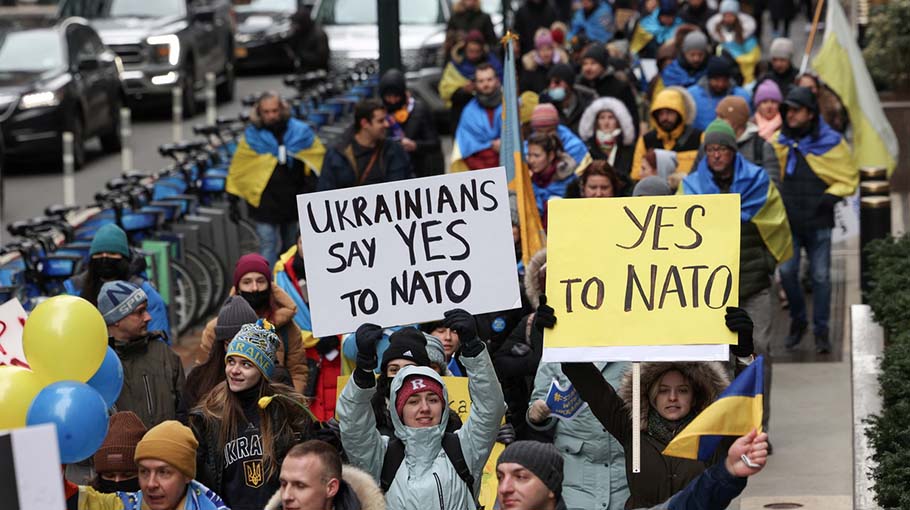Trump praises Putin, putting Republican leaders in a bind


As Russia prepared to strike Ukraine and the United States rushed to defend neighbouring allies in Europe, former US President Donald Trump had nothing but admiration for President Vladimir Putin of Russia.
He is "pretty smart," Mr Trump said Wednesday (Feb 23) at a Florida fundraiser, assessing the impending invasion like a real estate deal. "He's taken over a country for US$2 worth of sanctions," he said, "taking over a country - really a vast, vast location, a great piece of land with a lot of people - and just walking right in."
Historians called the remarks unprecedented.
"The idea that a former president would praise the man or leadership who US troops are even now travelling to confront and contain," said Mr Jeffrey Engel, a presidential historian at Southern Methodist University in Dallas, "is astounding."
Yet Republican leaders, while condemning the invasion of Ukraine, stayed silent about the ex-president's repeated praise this week for Mr Putin, even as some Mr Trump allies - from former administration figures to Fox News host Tucker Carlson - amplified his Russian-friendly views to the party's core. Foreign policy experts and Russia scholars said the apparent sympathy or ambivalence toward Moscow from elements of the right raised questions about the influence Mr Trump continues to exert over candidates seeking to tap into his base, the legacy of a decade-old effort by the Kremlin to court American conservatives and the future of the GOP amid a backlash against the Republican-led entanglements in Afghanistan and Iraq.
Cold War-era Republicans, historians said, would have repudiated comments like Mr Trump's as un-American.
Professor Anders Stephanson, a historian of foreign policy at Columbia University, recalled an earlier Russian operation.
"Could one imagine Dwight Eisenhower praising Leonid Brezshnev for invading Czechoslovakia in 1968?" he asked in an email. "I think not."
Republican congressional leaders on Thursday stayed far away from the Putin-friendly views that had
been emanating from the former president. Senator Mitch McConnell of Kentucky, the Republican leader, denounced Mr Putin at length and urged the Biden administration to provide military aid to help the Ukrainians fight back.
Asked at a news conference in Louisville about Mr Trump's comments, the senator responded with silence.
As the threat of a Russian invasion rose, Mr Mike Pompeo, a former secretary of state and CIA chief under Mr Trump, and now a potential presidential aspirant, appeared to take a similar line to his former boss. Mr Putin was "an elegantly sophisticated
counterpart" and "very shrewd," Mr Pompeo said.
But as the Russian onslaught neared, Mr Pompeo on Wednesday qualified those views. Mr Putin was also "evil" and "should be crushed," he told The Des Moines Register on a visit to Iowa.
Other Republicans across the country who are closest to the party's base - House members and primary candidates - have often sought to deflect questions about their stance on Ukraine with answers that avoid breaking with Trump or agreeing with President Joe Biden.
A chorus of Republicans are arguing that the White House is worrying more about a distant conflict than about illegal immigration.
"Why does Joe Biden care more about Ukraine's border than the US southern border?" the official Twitter account of the Republican minority of the House Judiciary Committee declared Wednesday.
Senator Josh Hawley, last week took a step toward the Trump-supporting base and away from the Republican leadership, arguing that Nato should placate Russia by refraining from expanding membership to Ukraine.
"My view is that China is our No. 1 security and economic threat," Mr Hawley said last week. "This is what leads me to being very sceptical of an expansion. I don't think we can afford, in both the literal and colloquial uses of that term, to expand our security commitments in Europe."
But on Thursday, Mr Hawley joined the leadership in urging Mr Biden to send Ukraine military equipment and "sanction Russian energy production to a halt."
Mr Andrew Weiss, a Russia expert at the Carnegie Endowment for International Peace, said the Kremlin had sought for a decade to win over allies on the American right, in part by denouncing gay rights, emphasising Russian support for conservative social norms and inviting visits from prominent evangelical figures like Franklin Graham.
"It's worked beautifully," Mr Weiss said.
Mr Steve Bannon, a former adviser to Mr Trump who hosts a popular conservative podcast, hinted this week at the success of those efforts. "Putin ain't woke - he is anti-woke," Mr Bannon said approvingly Wednesday.
He was interviewing Mr Erik Prince, the private security contractor and a member of a prominent family of evangelical Christians and Republican donors, who joined Mr Bannon in commending Russia for its opposition to transgender rights.
On Thursday, Mr Bannon argued that Congress should impeach Mr Biden for "instigating this war in Ukraine."
"There is no appetite in Europe to defend themselves, OK?" Mr Bannon said. "Now you've gone in and stirred up a hornet's nest."
Dr Hal Brands, a historian at Johns Hopkins University's School of Advanced International Studies and a resident scholar at the conservative American Enterprise Institute, compared the apparent sympathy for Russia among some on the right to earlier periods when groups on the political fringes embraced foreign rivals as foils for domestic opponents.
During the years before the United States entered World War II, for example, a handful of lawmakers lauded Adolf Hitler and Benito Mussolini for their strong leadership. During the early years of the Cold War, he noted, some on the far left spoke approvingly of the Soviet Union as an alternative to unfettered capitalism.
"Russia is a stand-in for anti-wokeness," he said.
But the current "fascination with Putin" among some on the right, he added, "is also wrapped up in the post-Trump sweepstakes."
"You see a lot of emulation going on among politicians who may or may not be authentically Trumpian but nonetheless want to claim that part of the party's base for their own political ambitions."


